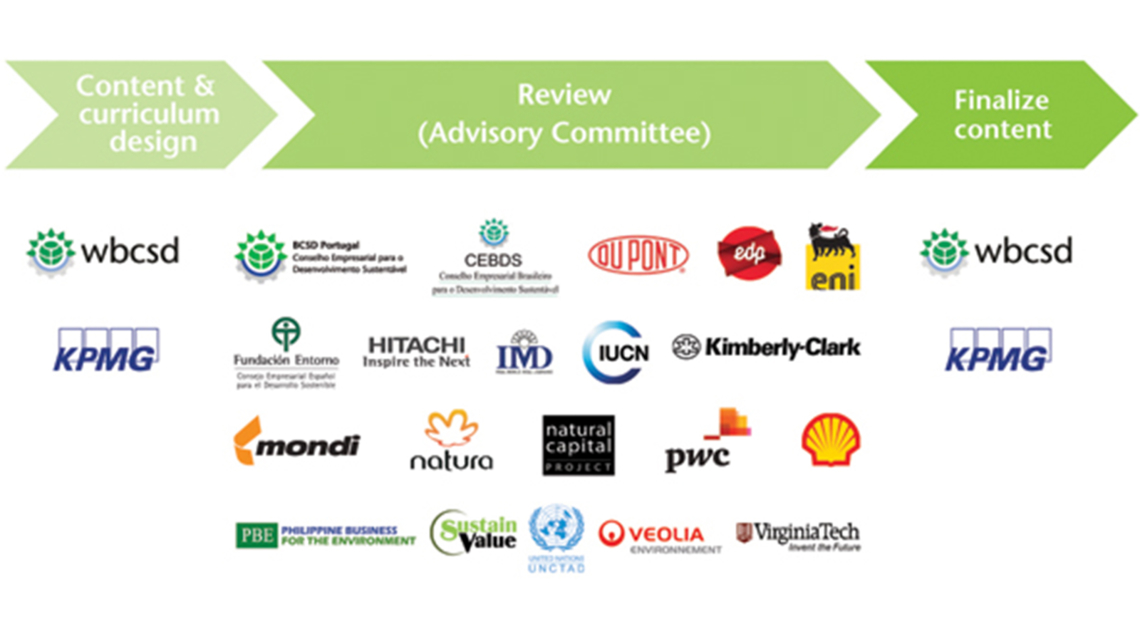Business Ecosystems Training (BET) course is a freely-available capacity building program to increase the knowledge and understanding of the links between ecosystems and business. The objective of BET course is to equip companies with the skills they need to better manage their impacts and dependencies on ecosystems and the services that they provide. The program draws on the wealth of WBCSD materials, methodologies and tools that have been developed over the past 10 years.
BET has been designed to get employees from different functions and business units thinking not only about ecosystems and the services they provide, but also how their organization can impact or depend on them. It is structured as four modules, which gradually go into more detail on the topic, depending on the needs of the learner.
BET has been developed by the WBCSD in collaboration with KPMG and an advisory committee that brings together some of the world’s largest companies, NGOs, UN related organizations, and academic institutions.
This collaborative development process makes BET a unique tool for learning about the links between ecosystems and business.
Comments from BET Advisory Committee members
"Companies interested in a long-term business model need to manage both risks and opportunities arising from ecosystem degradation. BET is a strong tool designed to raise awareness, and we will use it internally to assure our employees will consider this new challenge in future decision making."
António Neves de Carvalho, Head of the Corporate Sustainability and Environmental Office, EDP
“BET is an excellent training initiative of WBCSD which promote a real integration of ecosystems into business decisions. I specially encourage companies with a high impact or dependence on ecosystems to use BET. I am sure this learning tool will be very useful to them.”Cristina García-Orcoyen
Director General, Fundación Entorno-BCSD España
“BET is effective education material for company employees. It informs on the links between impacts to, and dependencies on, ecosystems and business activities. It allows the participants to think further in innovative ways so they can address ecosystem conservation and sustainable use issues using new insights.”
Yoichi Takahashi, Deputy General Manager, Environmental Strategy Office, Hitachi, Ltd.
“Biodiversity and ecosystem considerations should be an element of organisations’ sustainability strategies, which not only represent good governance but are increasingly recognised as making a contribution to commercial outputs - such as risk management, resource efficiency and reputation - which drive performance.”
Vincent Neate, Head of climate change & sustainability, KPMG
“BET will no doubt be of immense value to countless organizations and individuals wanting to enhance their knowledge of this poorly understood yet critically important topic.”
James Spurgeon, Sustain Value
“As more and more companies realize the importance of natural capital for their bottom line, they are looking for simple, accessible training materials to begin learning about the concepts, tools and approaches. BET is a useful resource to help businesses learn the basics, and thereby take the first critical step towards integrating the value of nature into their decisions.”
Emily McKenzie, Manager, Natural Capital Project
“We are very pleased to have worked with the WBCSD to develop this valuable training designed to build the understanding within businesses of their links with ecosystems.
Biodiversity and ecosystems are increasingly being recognised as critical business issues. After all geographical areas selected by organisations as a source of materials or supplies are relied upon at an operational level and impact business decision making. There may also be non financial costs that warrant recognition and measurement, with particular reference to water scarcity issues and knock on impacts of industrial production on other local industries such as farming or fishing.
The course - which can be delivered by KPMG trainers - explores the drivers, regulatory pressures, frameworks and, most significantly, the business case for ecosystem service measurement and management. The course specifically considers the use of valuation, the mitigation hierarchy and the issues and mechanisms available for offsetting and the role of sustainability reporting.”
Dr Stephanie Hime, Lead Specialist, Biodiversity and Ecosystem Services in Climate Change & Sustainability practice, KPMG

